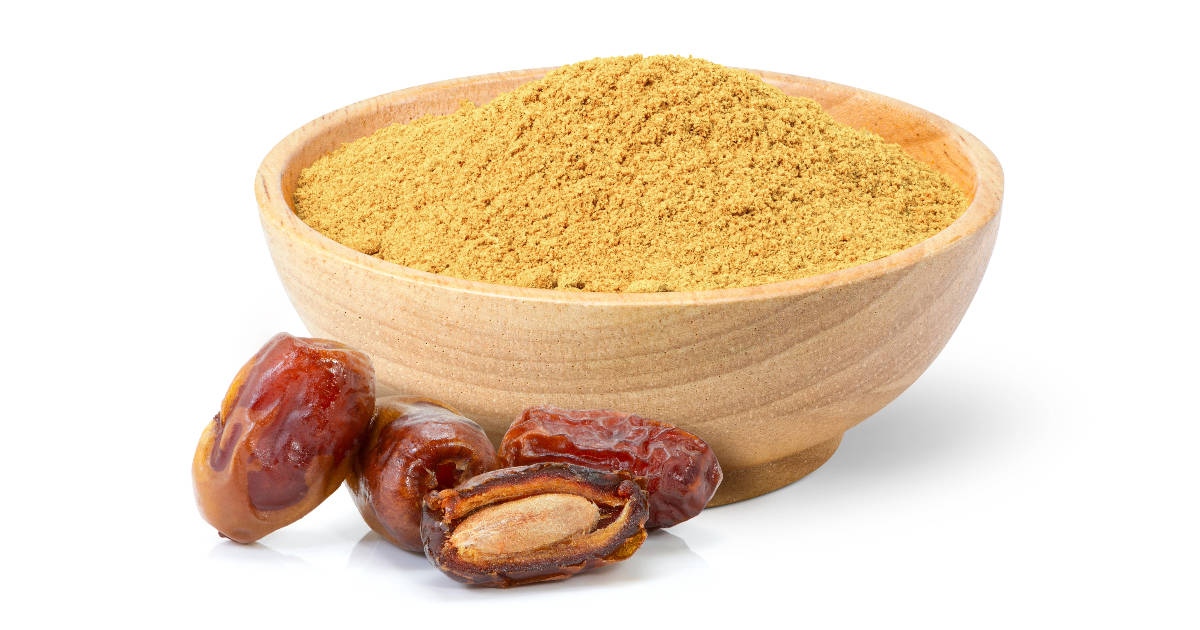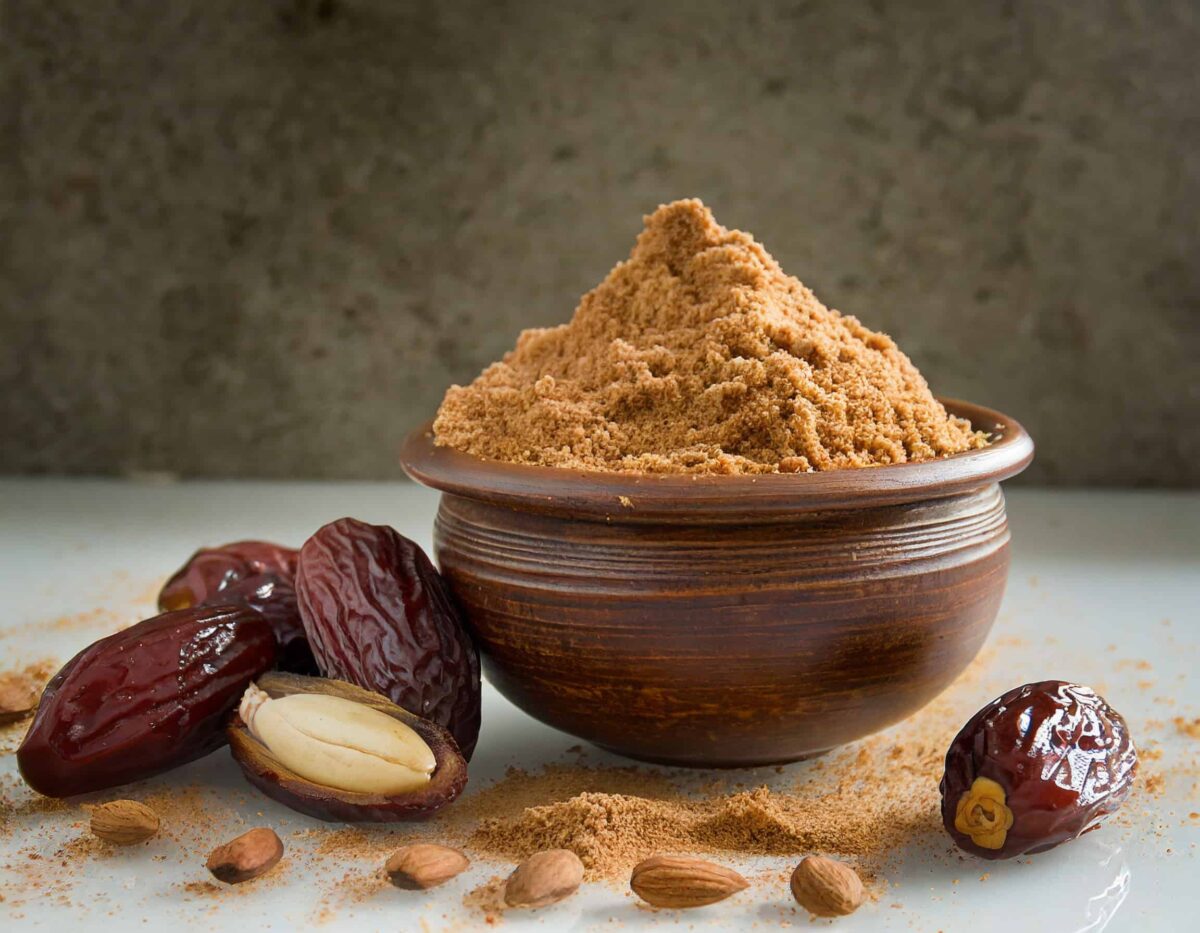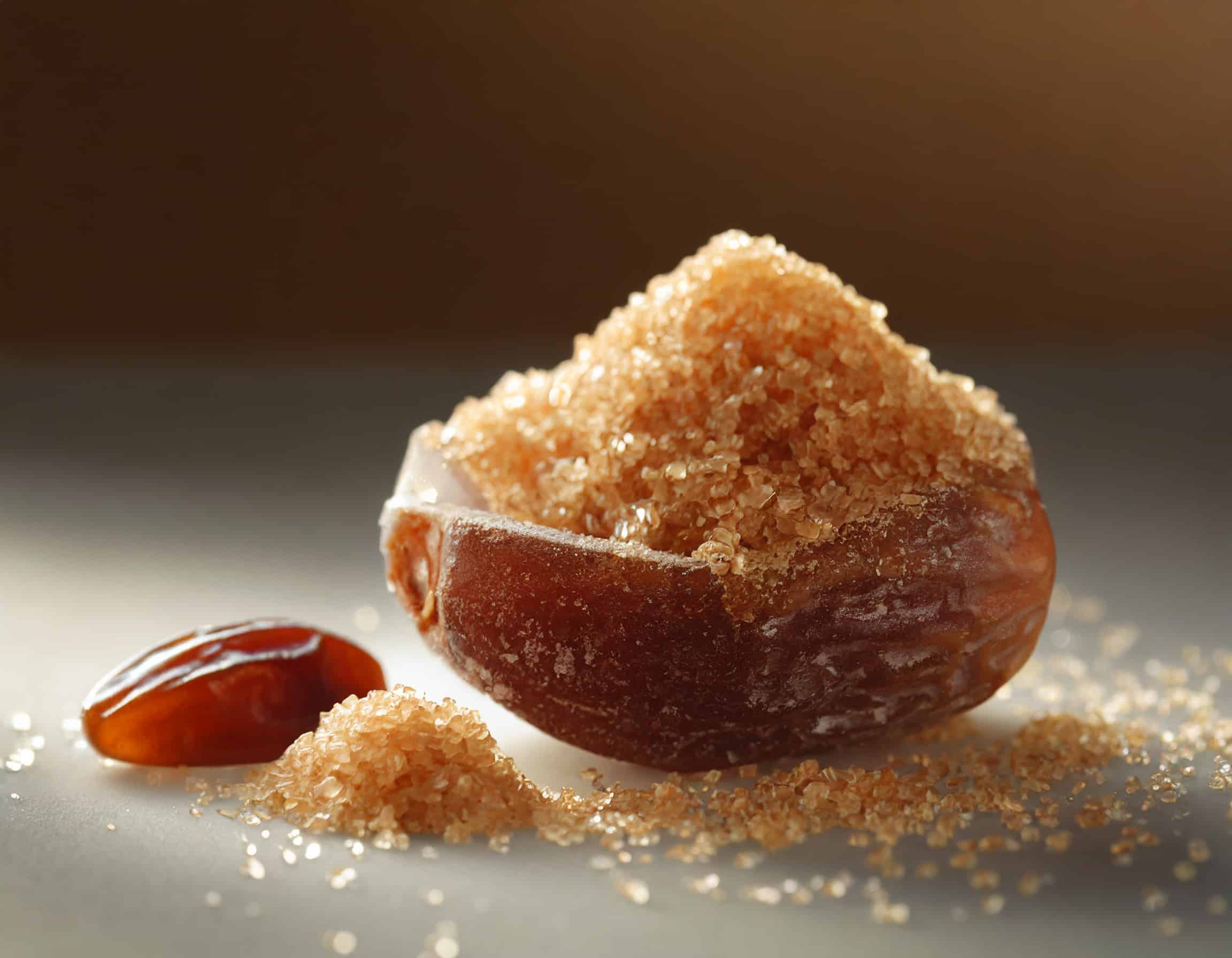Dates have become an increasingly popular natural sweetener in recent years.

With their rich, caramel-like flavor and impressive nutrient profile, dates offer a healthier alternative to processed sugars.
There are two main forms of date sweeteners - date powder and date sugar.
What is Date Powder?

Date powder, also known as date sugar, is made from whole dried dates that have been finely ground into a powder. To make date powder, dates are first dried and pitted. The dates are then sorted, washed, and put through a grinding process to turn them into a smooth, fine powder.
No other ingredients are added - the powder is 100% dried ground dates. This means that date powder retains all of the nutrients found in whole dates, including:
- Fiber - Dates are high in dietary fiber, which promotes digestive health.
- Potassium - Dates provide potassium, an essential mineral for heart and nerve function.
- Antioxidants - Dates contain antioxidant compounds like carotenoids and phenolic acids.
- Iron - Dates supply iron, which aids in oxygen transport in the blood.
- Magnesium - Magnesium in dates helps regulate muscle and nerve function.
- Vitamin B6 - Dates are a source of vitamin B6, which supports red blood cell production.
The nutrient profile of date powder can vary slightly depending on the specific varieties of dates used and how finely they are ground. But in general, date powder offers the concentrated nutritional benefits found in whole fresh dates.
What is Date Sugar?

Date sugar refers to a different form of date-based sweetener made from dried, ground dates. To make date sugar, dried dates are coarsely chopped or shredded and then ground into small granules or crystals.
The texture of date sugar resembles brown sugar, with a grainy, clumped appearance rather than a fine powder. Date sugar can be used as a 1:1 replacement for regular brown or white sugar in recipes.
Just like date powder, date sugar retains the fiber, vitamins, minerals, and antioxidants found in fresh dates. The only difference is the coarser, more granular texture compared to the finely ground date powder.
Both are unprocessed, natural sweeteners made solely from dried dates. The main difference comes down to texture.
Key Differences
Now that you understand the basics of date powder and date sugar, let's dive into the key differences between the two:
The most obvious difference between date powder and date sugar is the texture:
- Date powder has an ultra-fine, flour-like consistency. It becomes almost fully incorporated into batters and liquids.
- Date sugar has a coarse, granular texture like brown sugar. The date particles are still visible and retain a crystallized structure.
This textural difference affects how the sweeteners function in recipes. Date powder blends and dissolves more smoothly, while date sugar provides more chew and crunch.
The glycemic index (GI) measures how quickly foods raise blood glucose levels.
- Date powder has a lower GI of 42. The fine powder is digested more slowly than sugar.
- Date sugar has a slightly higher GI around 55. The coarser texture is broken down more quickly.
So date powder results in a gentler rise in blood sugar compared to regular sugar or date sugar. This makes date powder preferable for people with diabetes or those looking to manage blood glucose response.
Solubility refers to how well a substance dissolves in liquid.
- Date powder is more soluble and dissolves into liquids evenly.
- Date sugar does not fully dissolve and leaves gritty texture in drinks.
Date powder integrates smoothly into coffee, tea, smoothies, and other beverages. Date sugar tends to sink to the bottom or leave residue.
The different texture and solubility make date powder and date sugar suitable for different uses:
- Date powder works well in smoothies, dressings, sauces, baked goods, and more.
- Date sugar can replace brown sugar in recipes but may not fully dissolve in liquids.
Date powder is the more versatile option that can be adapted to both solid and liquid applications.
Both date powder and sugar offer that characteristic sweet, caramelized date flavor. However, the flavor may come through slightly differently:
- Date powder provides evenly distributed date flavor throughout a recipe.
- Date sugar adds pockets of concentrated date flavor where the granules remain.
Date powder assimilates more uniformly into the other ingredients. Date sugar retains more distinct bursts of date taste.
Since both are made from dried whole dates, date powder and date sugar have very similar nutritional profiles. The differences are minor:
- Date powder may retain slightly more antioxidants from finer grinding.
- Date sugar likely provides a little more fiber from the intact date particles.
But overall, both offer concentrated nutrition from dates, including fiber, minerals like potassium and magnesium, and protective plant compounds. Choose based on texture and functionality rather than nutritional superiority.
Key Takeaway: Date powder has a fine, flour-like texture that blends smoothly into liquids and batters. Date sugar has a coarser, crystallized structure that provides more crunch. The solubility and glycemic differences make date powder better for certain diet types.
Health Benefits

Both date powder and date sugar provide a range of potential health benefits:
The fiber and nutrients in dates help slow the absorption of sugars, resulting in a lower glycemic response compared to regular sugar. This helps manage blood glucose levels.
Dates contain carotenoids, phenols, flavonoids and other plant compounds that act as antioxidants in the body to prevent cellular damage from oxidation and inflammation.
The dietary fiber in dates promotes digestive health and gut microbiome balance. Fiber also contributes to feelings of fullness.
Dates provide a number of bone-supporting nutrients like calcium, phosphorus, magnesium, manganese and vitamin K. The boron in dates also aids calcium absorption.
Potassium helps balance fluid levels in the body and relax blood vessels, potentially lowering blood pressure in those with hypertension.
Date phytochemicals reduce oxidative stress and inflammation to support healthy liver function and protect liver cells.
Overall, incorporating date powder or date sugar into your diet can provide anti-inflammatory, antioxidant protection, stabilized blood sugar, and other health benefits attributed to dates.
Tips
Here are some tips for using date powder and date sugar:
- Start with a 1:1 ratio replacement for sugar in recipes. Adjust to taste.
- Chopped nuts, oats or desiccated coconut can balance out the soft texture from date powder.
- For beverages, blend date powder with a small amount of hot water first to prevent clumping.
- Date sugar adds nice texture contrast paired with smooth nut butters or blended fruits.
- Since dates are sticky, date powder can help bind granola bars, energy bites and other compressed snacks.
- Use date sugar to rim glassware for cocktails in place of brown sugar.
- Add date powder to milk or nondairy milk as a flavor enhancer and light sweetener.
- Sprinkle date powder over yogurt, oatmeal or desserts for sweetness and nutrition.
- Make a paste with date powder, tahini, vanilla and milk for a healthy dessert dip.
The natural caramel flavor and nutritional goodness make date powder and date sugar versatile sweet additions to a wide range of healthy recipes and snacks!
Key Takeaway: Both date powder and sugar provide concentrated nutrition and antioxidants from dates. Date powder has more versatility for blending into liquids and batters smoothly.
FAQs
How do you substitute date powder for sugar?
Use a 1:1 ratio to replace regular granulated or brown sugar. For example, replace 1 cup sugar with 1 cup date powder. Reduce liquid slightly to account for moisture in dates.
What is the difference between date paste, date syrup and date powder?
Date paste is pureed dates with a thick, spreadable texture. Date syrup is the liquid extracted from dates. Date powder is made from ground dried dates with no liquid added.
Can you use date sugar in coffee?
Yes, but date powder dissolves more evenly in hot coffee rather than sinking to the bottom of the cup. Use an immersion blender for smoother consistency.
Is date sugar keto-friendly?
Yes, both date powder and sugar are low in glycemic impact and high in fiber, making them a good sugar substitute option on a keto diet. Portion sizes should still be monitored.
What does date powder taste like?
Date powder has a sweet, rich caramel and maple-like flavor. It provides undertones of date rather than an overtly distinct taste.
Is date sugar healthy for diabetics?
The fiber and nutrients in dates help slow sugar absorption, making date powder and sugar healthier alternatives to regular sugar for diabetics. But portion control is still important.
Conclusion
Date powder and date sugar offer two different takes on sweetening with dates. Date powder provides an ultra-fine powder with smooth blendability, while date sugar has a coarser, crystallized texture.
The lower glycemic impact and increased solubility make date powder the winner for more versatility. But date sugar shines when you want distinct granules and date flavor pops.
Resources:
- Nature's Path: This website explains why date powder is a great sugar substitute and highlights its nutrient-rich, high-fiber, and antioxidant properties.
- Global Foods: This website discusses the advantages of date powder as a sweetener for food manufacturers, including its minimal processing, nutrient density, and dietary compatibility.
- Woodspur Farms: This website provides information on the benefits of date powder, including its nutrient density, lack of chemicals or preservatives, and gluten-free, organic, and kosher certifications.
- Date Lady: This website offers organic date sugar made from whole crushed dates that retains fiber and minerals, making it a nutrient-dense alternative to other sweeteners.
- Oasis Date Gardens: This website explains the nutritional benefits of date sugar, including its high antioxidant content and natural sweetness, and provides a recipe for brownies made with date sugar.

